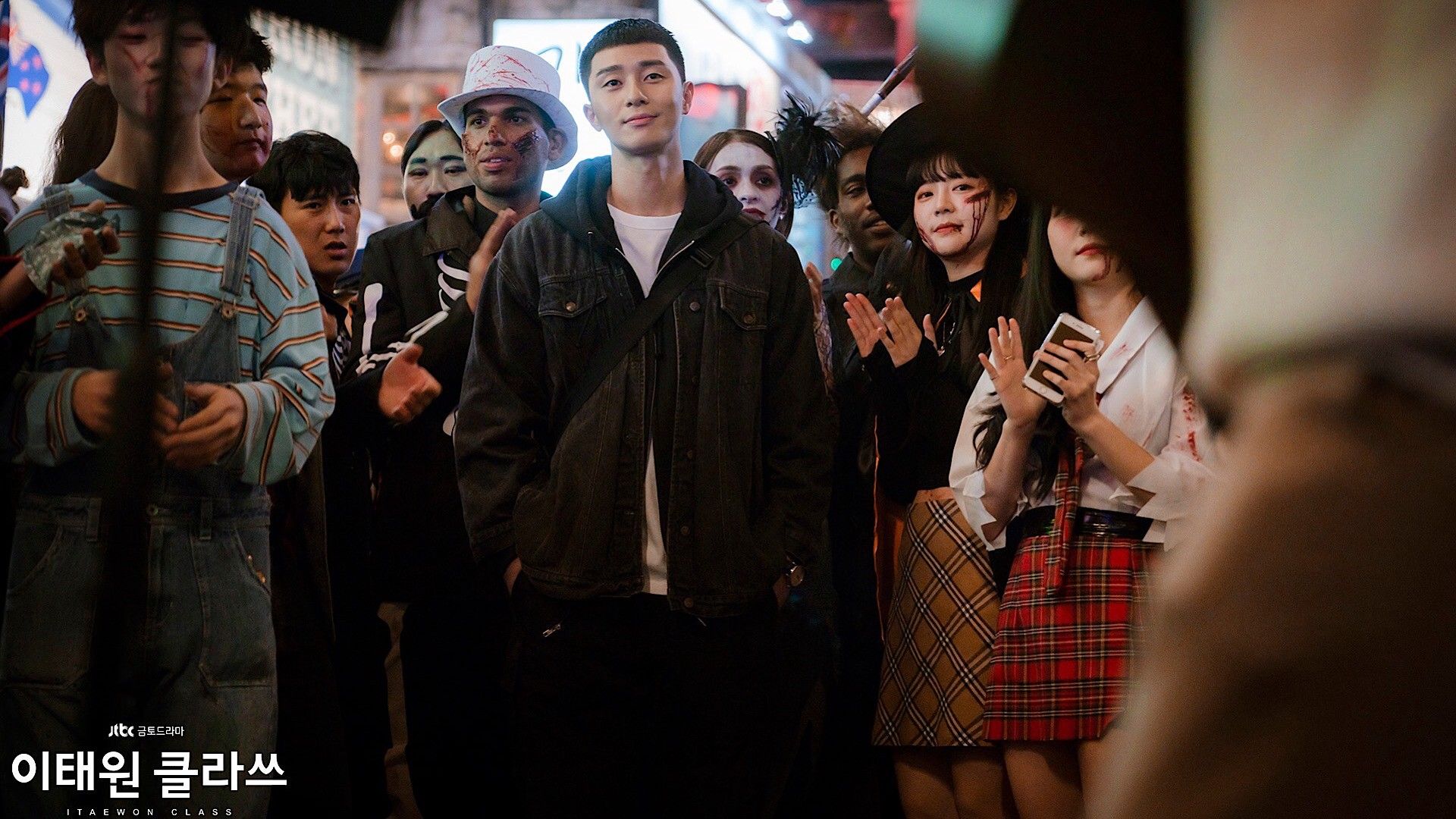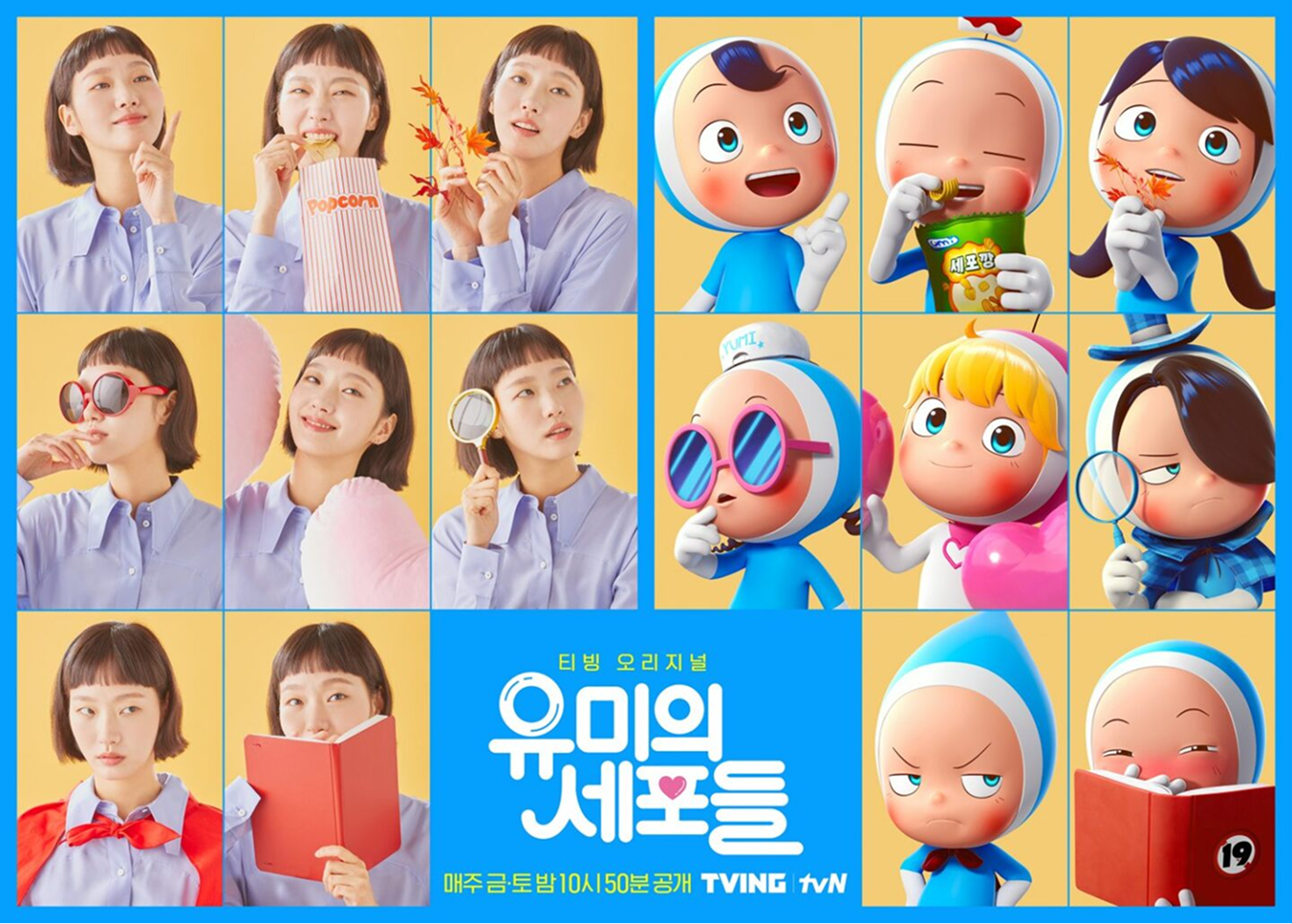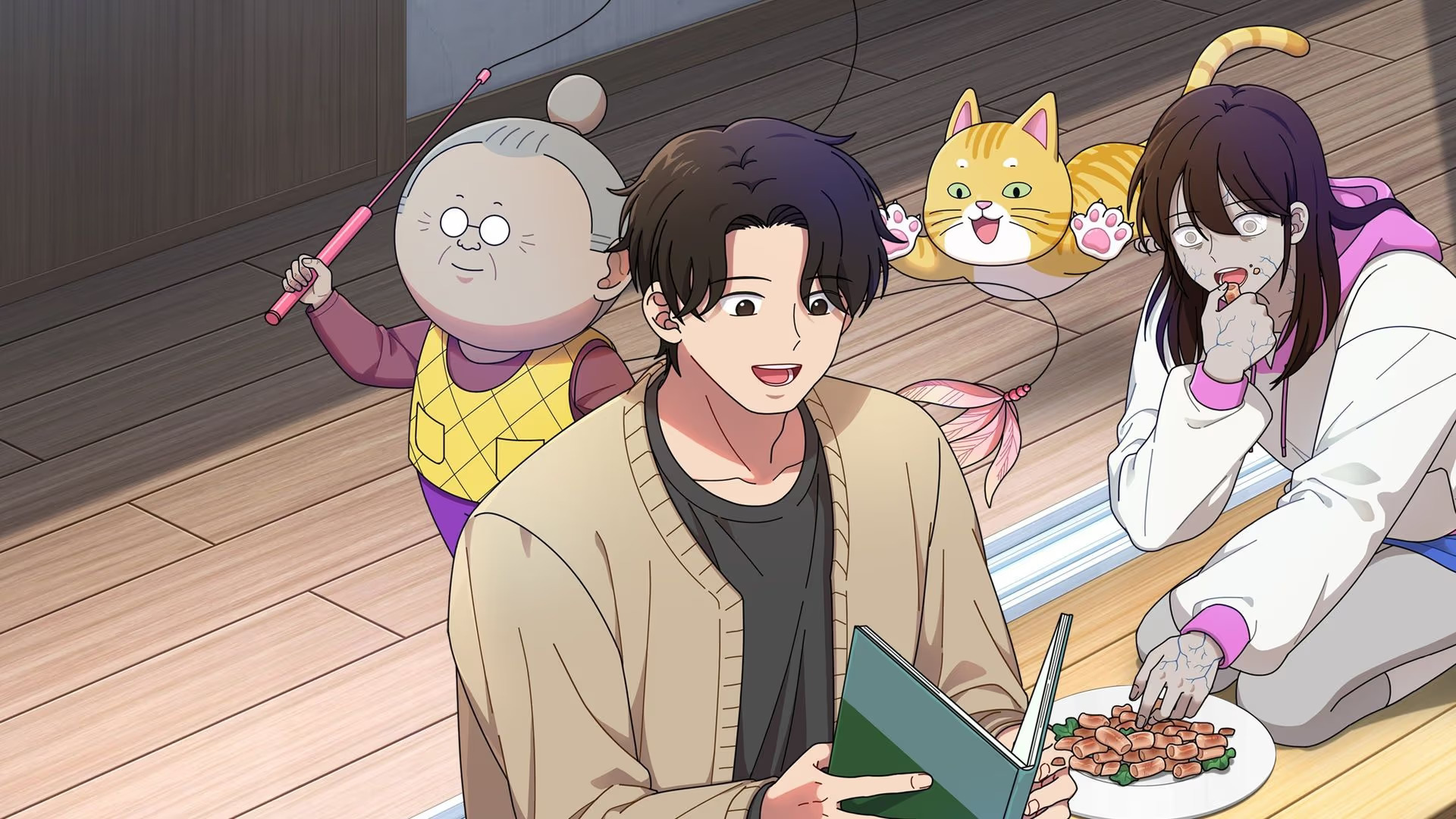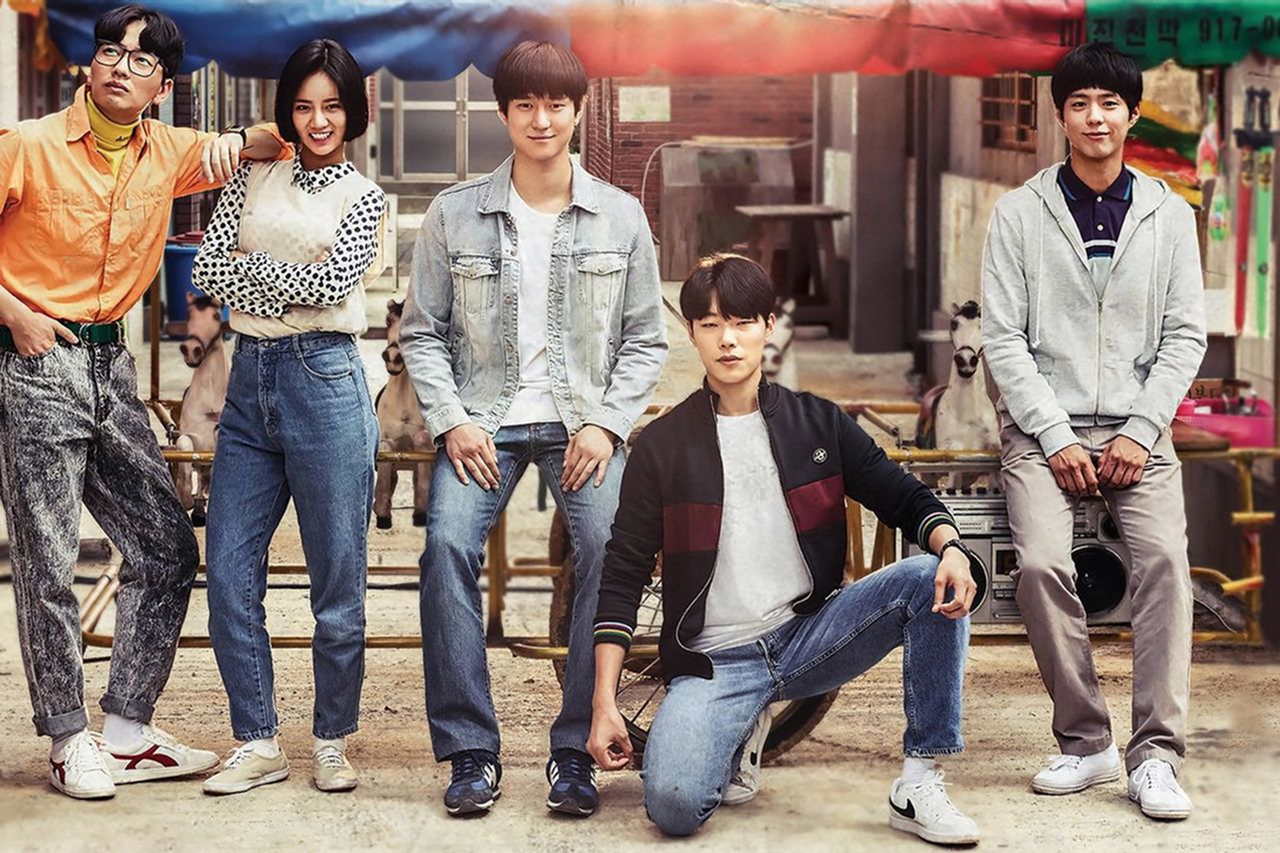7 K-Dramas to Learn and Practice Korean Language
We’re launching a new series: researching Korea, your next digital nomad spot, by watching K-Dramas. You can thank us later 🫶
K-Dramas can be ridiculous, smart, dramatic, magical, and pretty - which means they also cover all sorts of topics, like doctors, lawyers, singers, and ghost hunters.
When you’re learning Korean, they’re endless listening practice. You’ll find them an especially efficient method to learn the subtleties of politeness in the Korean language, get a grasp of how people refer to each other, expand your vocabulary lists and keep up to date with the latest slang.
We’ve chosen 7 series to watch to improve your Korean. They, of course, happen to be great shows. So… 가자!
Note: The streaming platforms indicated are the ones for Korea-based watching.
Itaewon Class (2020, Netflix)

Are Itaewon Class’s first episodes the best first episodes in K-Drama history? We’ll let you make up your mind. But while the jury’s out, there's no better drama to learn about slang and power dynamics in the Korean language.
The story starts with Park Sae-ro-yi, being expelled from high school for standing up to a rich bully. Then his life takes a worse turn when his father is killed in an accident, caused by the same bully. Years later, driven by the will to fight injustice and prejudice, Sae-ro-yi opens a bar-restaurant in Seoul’s Itaewon district - home to expats and misfits.
You’ll learn: slang, when to use the polite and casual registers, and to believe in your dreams.
Yumi’s Cells (2021-22, Apple TV)

Based on a webtoon, Yumi’s Cells has a concept similar to Inside Out, the Pixar animation movie. Office worker Yumi navigates love and work, all while being guided - or sabotaged! - by her “cells”. Those animated “cells” are tiny characters in her mind, each representing an emotion or an urge. They turn the lull of everyday life into an epic rollercoaster.
Mature and so relatable, Yumi’s Cells has multiple seasons (two are already available, and season 3 has been announced for 2026) to help you learn with adorable animated characters.
You’ll learn: to name all your emotions, daily vocab, and flirting tips.
My Daughter is a Zombie (2022, Netflix/Naver Webtoon)

In this wacky animated comedy adapted from hit webtoon My Daughter is a Zombie, the Kim family’s daughter suddenly turns into a zombie - and her dad plays along as if everything’s fine. Meant for kids, the sentences and vocabulary are very simple. But the humor and emotional impact of the story go way beyond the target audience.
If animation isn’t your thing, you can also watch the movie (2025, starring comedy superstar Jo Jeong-seok), inspired by the webtoon, which also turned into a box office hit upon release.
You’ll learn: easy sentences and how to take care of a zombie.
Reply 1988 (2015, Netflix)

When do you call someone “older brother” or “older sister”? Why are some women called “hyung-nim” even though it’s supposed to only be said by men about an older man? You’ll be clear on all the subtleties of referring to each other by the state of your relationship (according to age, closeness, context, and hierarchy) after watching Reply 1988.
This third installment of the Reply is generally considered the best one. Full of nostalgia for the late 80s, it depicts the lives of five friends living on the same street. First loves, family hijinks, and history all come together for this cult success.
You’ll learn: all about the 80s, hyungs, oppas, noonas, and eonnis.
Bon Appétit, Your Majesty (2025, Netflix)

When a modern chef ends up thrown back in time, she has to rely on her cooking skills to convince the worst tyrant in Korean history to keep her alive… And help her go back home. Fun and beautifully shot, Bon Appétit, Your Majesty basically is a cooking show in Korea’s Middle Ages (Joseon). The first 8 episodes, especially, are an absolute delight.
It’s a perfect choice to learn Korean food terms, royal polite speech, modern slang, and even some recipes.
You’ll learn: food, modern slang, food, “jeonha!”, food.
Crash Landing on You (2019, Netflix)

After an improbable paragliding accident, a wealthy South Korean woman ends up in North Korea. There, she is rescued by a local officer, sparking an impossible romance between their two worlds.
Heralded as the ultimate romance drama, Crash Landing on You is educational on many counts: you’ll learn the difference between South and North Korean accents, as well as what not to do if you ever end up on the wrong side of our divided country.
You’ll learn: the North Korean expressions to pass for a local if you ever have a paragliding accident.
Business Proposal (2022, Netflix)

When Shin Ha-ri poses as her friend on a blind date with her boss, things spiral into mistaken identities and a fake relationship. This hilarious comedy, inspired by a webtoon, is a great way to learn Korean.
For comedy purposes, you’ll see words coming out of the characters' mouths - a great way to mix listening and reading practice. Business Proposal’s topics are also quite simple, focusing on romance and life at the office.
You’ll learn: ssi, nim, hoobae, sunbae, and finally discover the origin of the “Samantha and Rachel” meme.
We’ll certainly be watching some during our next workation in Jeju!
If you want to know more about living as a Digital Nomad in Korea, you can join our Whatsapp & Discord community, and read the comprehensive guide we wrote on the topic!
7 K-Dramas to Learn and Practice Korean Language
We’re launching a new series: researching Korea, your next digital nomad spot, by watching K-Dramas. You can thank us later 🫶
K-Dramas can be ridiculous, smart, dramatic, magical, and pretty - which means they also cover all sorts of topics, like doctors, lawyers, singers, and ghost hunters.
When you’re learning Korean, they’re endless listening practice. You’ll find them an especially efficient method to learn the subtleties of politeness in the Korean language, get a grasp of how people refer to each other, expand your vocabulary lists and keep up to date with the latest slang.
We’ve chosen 7 series to watch to improve your Korean. They, of course, happen to be great shows. So… 가자!
Note: The streaming platforms indicated are the ones for Korea-based watching.
Itaewon Class (2020, Netflix)

Are Itaewon Class’s first episodes the best first episodes in K-Drama history? We’ll let you make up your mind. But while the jury’s out, there's no better drama to learn about slang and power dynamics in the Korean language.
The story starts with Park Sae-ro-yi, being expelled from high school for standing up to a rich bully. Then his life takes a worse turn when his father is killed in an accident, caused by the same bully. Years later, driven by the will to fight injustice and prejudice, Sae-ro-yi opens a bar-restaurant in Seoul’s Itaewon district - home to expats and misfits.
You’ll learn: slang, when to use the polite and casual registers, and to believe in your dreams.
Yumi’s Cells (2021-22, Apple TV)

Based on a webtoon, Yumi’s Cells has a concept similar to Inside Out, the Pixar animation movie. Office worker Yumi navigates love and work, all while being guided - or sabotaged! - by her “cells”. Those animated “cells” are tiny characters in her mind, each representing an emotion or an urge. They turn the lull of everyday life into an epic rollercoaster.
Mature and so relatable, Yumi’s Cells has multiple seasons (two are already available, and season 3 has been announced for 2026) to help you learn with adorable animated characters.
You’ll learn: to name all your emotions, daily vocab, and flirting tips.
My Daughter is a Zombie (2022, Netflix/Naver Webtoon)

In this wacky animated comedy adapted from hit webtoon My Daughter is a Zombie, the Kim family’s daughter suddenly turns into a zombie - and her dad plays along as if everything’s fine. Meant for kids, the sentences and vocabulary are very simple. But the humor and emotional impact of the story go way beyond the target audience.
If animation isn’t your thing, you can also watch the movie (2025, starring comedy superstar Jo Jeong-seok), inspired by the webtoon, which also turned into a box office hit upon release.
You’ll learn: easy sentences and how to take care of a zombie.
Reply 1988 (2015, Netflix)

When do you call someone “older brother” or “older sister”? Why are some women called “hyung-nim” even though it’s supposed to only be said by men about an older man? You’ll be clear on all the subtleties of referring to each other by the state of your relationship (according to age, closeness, context, and hierarchy) after watching Reply 1988.
This third installment of the Reply is generally considered the best one. Full of nostalgia for the late 80s, it depicts the lives of five friends living on the same street. First loves, family hijinks, and history all come together for this cult success.
You’ll learn: all about the 80s, hyungs, oppas, noonas, and eonnis.
Bon Appétit, Your Majesty (2025, Netflix)

When a modern chef ends up thrown back in time, she has to rely on her cooking skills to convince the worst tyrant in Korean history to keep her alive… And help her go back home. Fun and beautifully shot, Bon Appétit, Your Majesty basically is a cooking show in Korea’s Middle Ages (Joseon). The first 8 episodes, especially, are an absolute delight.
It’s a perfect choice to learn Korean food terms, royal polite speech, modern slang, and even some recipes.
You’ll learn: food, modern slang, food, “jeonha!”, food.
Crash Landing on You (2019, Netflix)

After an improbable paragliding accident, a wealthy South Korean woman ends up in North Korea. There, she is rescued by a local officer, sparking an impossible romance between their two worlds.
Heralded as the ultimate romance drama, Crash Landing on You is educational on many counts: you’ll learn the difference between South and North Korean accents, as well as what not to do if you ever end up on the wrong side of our divided country.
You’ll learn: the North Korean expressions to pass for a local if you ever have a paragliding accident.
Business Proposal (2022, Netflix)

When Shin Ha-ri poses as her friend on a blind date with her boss, things spiral into mistaken identities and a fake relationship. This hilarious comedy, inspired by a webtoon, is a great way to learn Korean.
For comedy purposes, you’ll see words coming out of the characters' mouths - a great way to mix listening and reading practice. Business Proposal’s topics are also quite simple, focusing on romance and life at the office.
You’ll learn: ssi, nim, hoobae, sunbae, and finally discover the origin of the “Samantha and Rachel” meme.
We’ll certainly be watching some during our next workation in Jeju!
If you want to know more about living as a Digital Nomad in Korea, you can join our Whatsapp & Discord community, and read the comprehensive guide we wrote on the topic!
7 K-Dramas to Learn and Practice Korean Language
We’re launching a new series: researching Korea, your next digital nomad spot, by watching K-Dramas. You can thank us later 🫶
K-Dramas can be ridiculous, smart, dramatic, magical, and pretty - which means they also cover all sorts of topics, like doctors, lawyers, singers, and ghost hunters.
When you’re learning Korean, they’re endless listening practice. You’ll find them an especially efficient method to learn the subtleties of politeness in the Korean language, get a grasp of how people refer to each other, expand your vocabulary lists and keep up to date with the latest slang.
We’ve chosen 7 series to watch to improve your Korean. They, of course, happen to be great shows. So… 가자!
Note: The streaming platforms indicated are the ones for Korea-based watching.
Itaewon Class (2020, Netflix)

Are Itaewon Class’s first episodes the best first episodes in K-Drama history? We’ll let you make up your mind. But while the jury’s out, there's no better drama to learn about slang and power dynamics in the Korean language.
The story starts with Park Sae-ro-yi, being expelled from high school for standing up to a rich bully. Then his life takes a worse turn when his father is killed in an accident, caused by the same bully. Years later, driven by the will to fight injustice and prejudice, Sae-ro-yi opens a bar-restaurant in Seoul’s Itaewon district - home to expats and misfits.
You’ll learn: slang, when to use the polite and casual registers, and to believe in your dreams.
Yumi’s Cells (2021-22, Apple TV)

Based on a webtoon, Yumi’s Cells has a concept similar to Inside Out, the Pixar animation movie. Office worker Yumi navigates love and work, all while being guided - or sabotaged! - by her “cells”. Those animated “cells” are tiny characters in her mind, each representing an emotion or an urge. They turn the lull of everyday life into an epic rollercoaster.
Mature and so relatable, Yumi’s Cells has multiple seasons (two are already available, and season 3 has been announced for 2026) to help you learn with adorable animated characters.
You’ll learn: to name all your emotions, daily vocab, and flirting tips.
My Daughter is a Zombie (2022, Netflix/Naver Webtoon)

In this wacky animated comedy adapted from hit webtoon My Daughter is a Zombie, the Kim family’s daughter suddenly turns into a zombie - and her dad plays along as if everything’s fine. Meant for kids, the sentences and vocabulary are very simple. But the humor and emotional impact of the story go way beyond the target audience.
If animation isn’t your thing, you can also watch the movie (2025, starring comedy superstar Jo Jeong-seok), inspired by the webtoon, which also turned into a box office hit upon release.
You’ll learn: easy sentences and how to take care of a zombie.
Reply 1988 (2015, Netflix)

When do you call someone “older brother” or “older sister”? Why are some women called “hyung-nim” even though it’s supposed to only be said by men about an older man? You’ll be clear on all the subtleties of referring to each other by the state of your relationship (according to age, closeness, context, and hierarchy) after watching Reply 1988.
This third installment of the Reply is generally considered the best one. Full of nostalgia for the late 80s, it depicts the lives of five friends living on the same street. First loves, family hijinks, and history all come together for this cult success.
You’ll learn: all about the 80s, hyungs, oppas, noonas, and eonnis.
Bon Appétit, Your Majesty (2025, Netflix)

When a modern chef ends up thrown back in time, she has to rely on her cooking skills to convince the worst tyrant in Korean history to keep her alive… And help her go back home. Fun and beautifully shot, Bon Appétit, Your Majesty basically is a cooking show in Korea’s Middle Ages (Joseon). The first 8 episodes, especially, are an absolute delight.
It’s a perfect choice to learn Korean food terms, royal polite speech, modern slang, and even some recipes.
You’ll learn: food, modern slang, food, “jeonha!”, food.
Crash Landing on You (2019, Netflix)

After an improbable paragliding accident, a wealthy South Korean woman ends up in North Korea. There, she is rescued by a local officer, sparking an impossible romance between their two worlds.
Heralded as the ultimate romance drama, Crash Landing on You is educational on many counts: you’ll learn the difference between South and North Korean accents, as well as what not to do if you ever end up on the wrong side of our divided country.
You’ll learn: the North Korean expressions to pass for a local if you ever have a paragliding accident.
Business Proposal (2022, Netflix)

When Shin Ha-ri poses as her friend on a blind date with her boss, things spiral into mistaken identities and a fake relationship. This hilarious comedy, inspired by a webtoon, is a great way to learn Korean.
For comedy purposes, you’ll see words coming out of the characters' mouths - a great way to mix listening and reading practice. Business Proposal’s topics are also quite simple, focusing on romance and life at the office.
You’ll learn: ssi, nim, hoobae, sunbae, and finally discover the origin of the “Samantha and Rachel” meme.
We’ll certainly be watching some during our next workation in Jeju!
If you want to know more about living as a Digital Nomad in Korea, you can join our Whatsapp & Discord community, and read the comprehensive guide we wrote on the topic!

%20copie.png)

